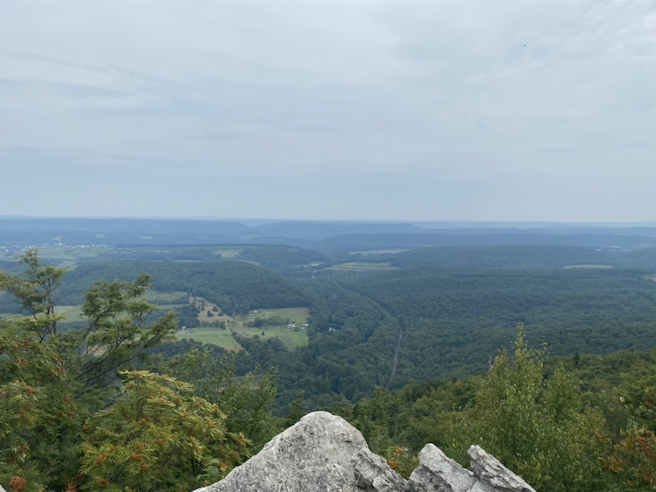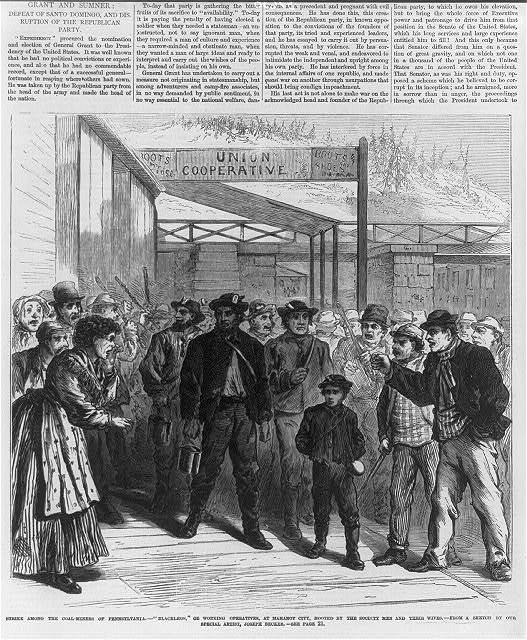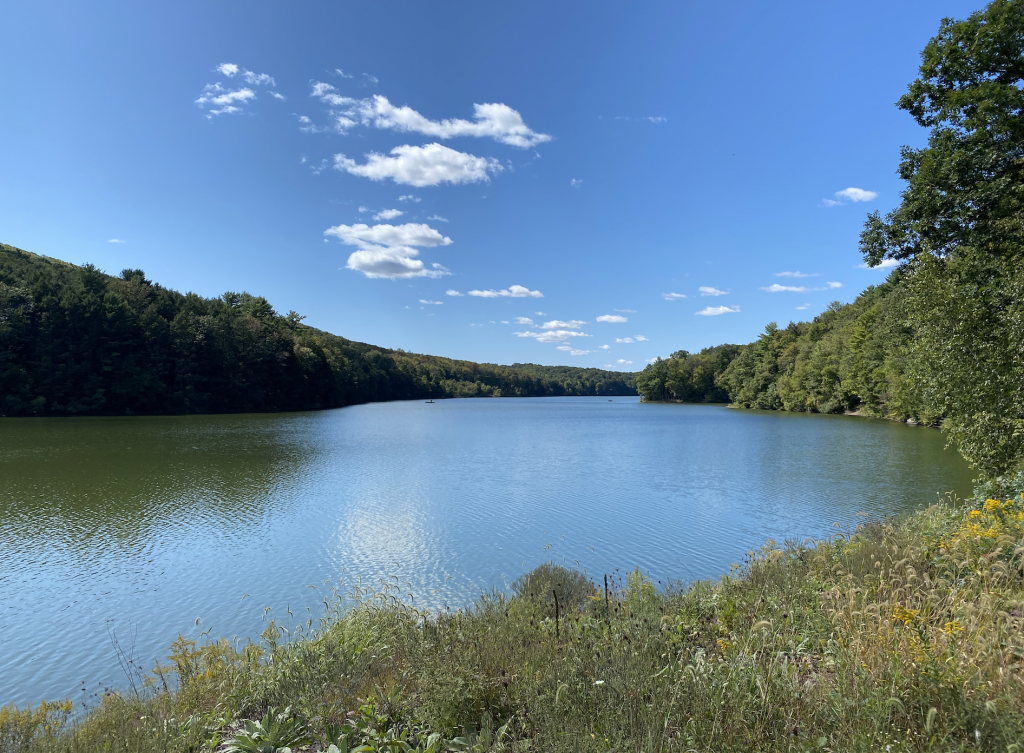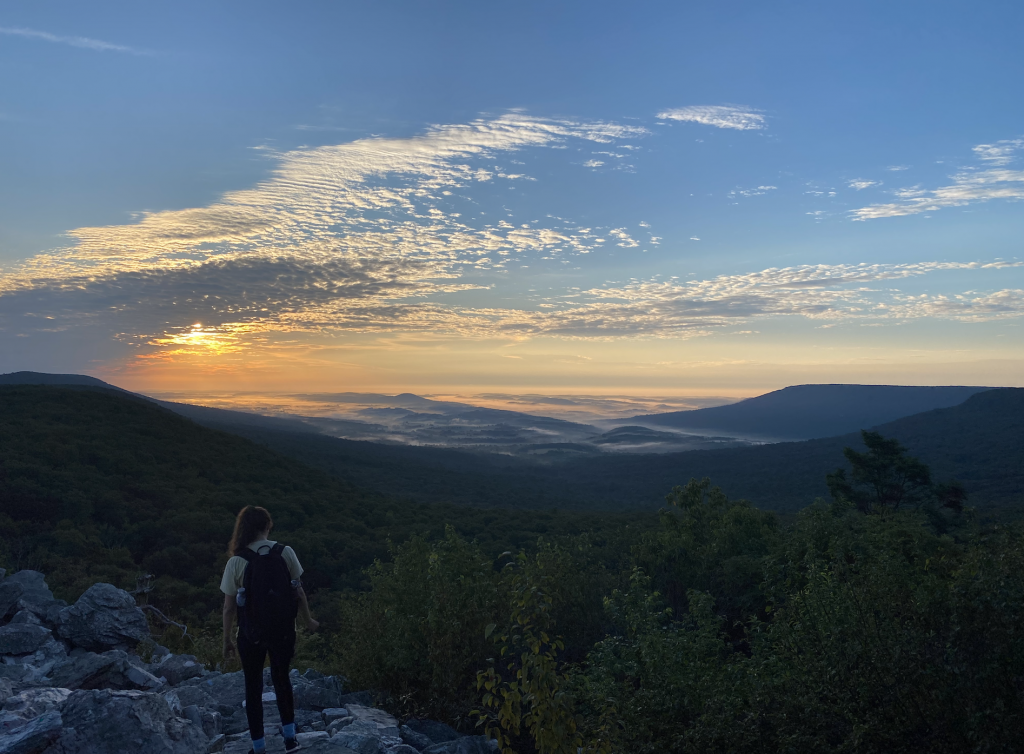
View from Hawk Mountain (Rachel Freed/George Washington University)

View from Hawk Mountain (Rachel Freed/George Washington University)
I never thought of my hometown as a beacon of justice. I grew up in Schuylkill County, Pennsylvania, an area nestled in the northern Appalachian mountains with a small town feel and conservative leanings. The county struggles with severe out-migration of youth, poor mental and physical health, and a lack of job diversity. After making a name for themselves in anthracite coal mining in the 19th century, the county transitioned to primarily manufacturing and distribution. To use the words of a fellow Schuylkill County resident, we “put all our eggs in one basket” with this move from mining to distribution. I always wondered, what went wrong? Was our violent, tumultuous past responsible for the lack of investment in the county in the present?
During my final semester at The George Washington University, I performed a community-engaged research project focused on my hometown to complete my Sustainability minor. Reflecting on my origins in Schuylkill County, I wondered about its future. I knew that as climate change worsens, people will seek safety in higher elevations and Appalachia will become a prime destination for thousands of Americans. How could Schuylkill County residents prepare for this demographic change? What role should they play in creating a sustainable future for this beautiful area? Through my research, I found that lessons from our past could give me those answers.
I grew up hearing stories of the wrongful hangings of innocent men who advocated for themselves and condemned bigotry in their community. The true intentions of the Molly Maguires, a secret society named after an Irish widow who protested against English landlords stealing land from the Irish, are debated to this day. The Mollies were persecuted for their extreme union activism and accused of terrorism in central Pennsylvania. John Kehoe, later dubbed the “King of the Mollies,” moved to Schuylkill County in 1868 to work in the coal mines amidst a wave of Irish immigration to the area. Kehoe’s confidence in this new world was squandered shortly after his work began. Irish miners were given the worst shifts in the most dangerous conditions, paid less than a living wage, and constantly berated by their superiors.

In response to this injustice, Kehoe and other Irish miners formed a sect of the Ancient Order of Hibernians (AOH), a benevolent, Irish Catholic fraternal organization originally founded to support Irish people battling oppression. When their wages were cut by 10% to 20%, frustrated miners decided to strike, resulting in the Long Strike of 1875, which ultimately failed. Miners went back to work, but their determination frightened the owners who sought to control them to make a profit.
The Reading Railroad Company president felt threatened by the AOH’s advocacy work, so he hired renowned detective Allen Pinkerton to investigate. Pinkerton, believing that some AOH members were also active “Mollies,” sent an operative named James McParlan undercover to link the entire AOH organization to the allegedly violent Molly Maguires. McParlan’s testimony, where he claimed that dozens of innocent men conspired to murder and rewarded members for murder, sullied the AOH name and devastated the strength of the organization. McParlan’s stories helped sentence twenty men, including John Kehoe, to death by hanging. From his cell, John Kehoe wrote, “Thinking over the Cruelties that has Befallen me, By Bribery Perjury and Prejudice … I am under the sentence of Death. for a Crime I Never Committed which I will Prove to you.” The hanging of the “Mollies” in Schuylkill County was an act drenched in social, religious, and ethnic bigotry. The AOH were champions of union activism and their work to empower thousands of miners should not be forgotten.

“How do you take those strengths of those people and turn it into something that is brave now?” Jeanne Elberfeld, a licensed social worker, asked me as I interviewed her for my research. I asked Elberfeld and two other Schuylkill County residents what they desired for the community in the coming decades –– and what they felt we had the potential to achieve.
Elberfeld said she envisions a community where people live collaboratively and cooperatively with one another; a community that thrives because the residents are united in common goals and communal success –– not individual gain. Elberfeld and other research participants, including Regina Gargano, stressed the importance of unity.
Gargano, executive director of the county’s tourism bureau, emphasized the significance of using the county’s past as a teacher. She said the younger generation needs to break cycles of poverty and lack of development by electing changemakers and ridding our community of economic plans that do not serve us.
Gargano recognized that reviving Schuylkill County would be a difficult process, but her hope was contagious. When asked what we have the potential to achieve, she said, “Our people here are special and they know how to create what they need. It’s just a matter of building the consensus on what it is we really need to prioritize and breaking down the parochialism that stifles unity among us. If we could apply this to dismantling the current power structure of our economic and political leadership and unite in trying to diversify that economic development, there’s no reason to believe it could not eventually succeed.”
When asked what she hopes for the future of the county, Jessi Trusky, a 23-year-old Schuylkill County resident, said inclusivity. She advocates for an environment where newcomers are welcomed and accepted and everyone gets an equal say in what happens in our community. I believe this sentiment will go a long way when the county eventually adapts to a demographic shift.

During my conversations with these women, I learned that our desires for our community are not so different from those of our ancestors. We all want the same thing: to grow together as a united, loving community where everyone looks out for each other. With this in mind, it’s important to reflect on the legacy of John Kehoe and the union activists who lost their lives fighting for equality and allow their bravery to motivate us in molding a more prosperous and sustainable future.
To answer Jeanne’s question –– “ How do we do this?” –– I think it is made possible by listening to and respecting one another. By giving voice to all members of the community and inviting young professionals to grow with us. One way to do this would be to repurpose abandoned coal mines and give them new life as solar energy sites, recycling centers, or underground farms. This change would encourage investment in sustainable technologies, create jobs, reduce blight, and attract outsiders to work in the area.
Appalachia should not be a forgotten region. Our community is strong, determined, creative, and hopeful. My hope for the future of Schuylkill County is that the next generation sees the results of these characteristics in action.